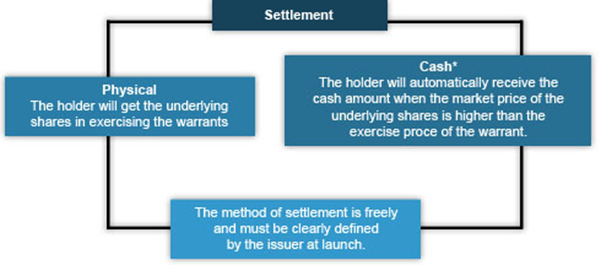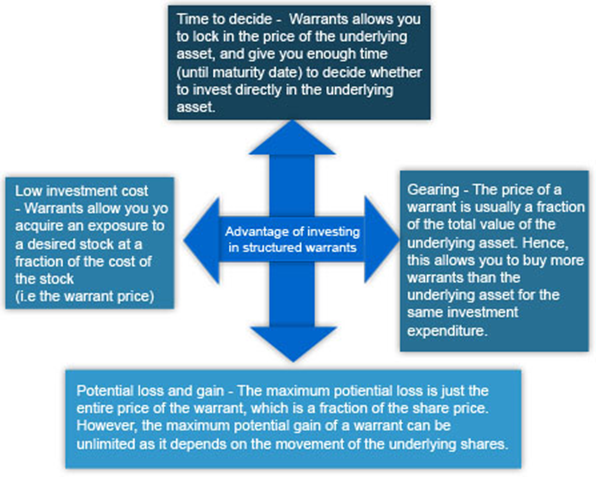What Are Structured Warrants?
- Home
- /
- Learning zone
- /
- Learn about Capital Market...
- /
- What Are Structured Warrants?
What Are Structured Warrants?
Are you aware that you can invest in warrants as an alternative to shares? What is a warrant? Is it risky? Read on to find out more.
Essentially, when you invest in a warrant, you are making a “reservation” to buy a predetermined number of shares at a certain price in the future. A warrant is a derivative, which means that its value is derived from the underlying shares. It provides a cheap way of investing in a listed company’s shares without having to pay the full amount. The downside is that it has a maturity period – usually up to 10 years – and is worthless if an investor holds it beyond the maturity date. It also does not give warrant holders any voting right, dividend and right to claim against the company’s assets.
IQ Bijak Labur Glossary
- Underlying Shares:
Also known as the “mother share”, which the warrant is based on. - Exercise Ratio:
Number of shares that a warrant will convert into if the warrant is exercised. - Exercise Price:
The agreed price for a warrant holder to buy shares based on the exercise ratio if a warrant is exercised. - Expiry Date:
The last day on which the warrant may be exercised. The expiry date of each warrant will be defined by the issuer of the warrant. - Settlement:
What a warrant holder receives when he exercises the warrant. It could be either cash or physically settled.
When a warrant holder wants to “exercise” and the exercise price (inclusive of the cost of the warrant) is less than the market price of the underlying share, the warrant holder will make a profit. However, if the exercise price is higher, the warrant holder will lose money. Examples of warrants are Khazanah’s basket warrrants, CIMB’s basket warrants, single stock warrants and OSK’s zero strike call warrants.
*To learn more about warrants, go here
What is a structured warrant?
To understand what a structured warrant really is, let’s compare the characteristics of a company warrant and a structured warrant.
Warrant
Issued by
Underlying shares
On exercise
Maturity period
Settlement
Company warrants
Listed company
Shares of the company
Company will issue additional shares to meet obligations. This results in share dilution
Up to 10 years
The terms and conditions of warrants are freely defined by the issuer
Structured warrants
Third-party financial institution
Any company shares that are not related to the financial institution (but must meet the requirements under the SC’s Guidelines for the Issue of Structured Warrants )
Does not result in dilution of the underlying shares
6 months to 5 years
What to look out for before investing in structured warrants
Action 1 – Understand the characteristics of warrants
As for other investment products, you should get a clear view and gain a better understanding of the nature of warrants, i.e. how it works, its benefits, as well as the risks involved. This is to ensure that warrants are the right investment product that matches your investment goals.
Action 2 – Identify the market direction
A warrant is a derivative product and its value is directly linked to the price of the underlying shares. If the price of the shares goes up (or down), the price of the warrants will move in tandem. For instance, if an investor anticipates that the market will do well, he can buy a call warrant to take advantage of price increases in the future. In the case of cash-settled warrant, if the current price of the underlying share is higher than the warrant’s exercise price and the warrant is exercised (before the maturity period), the holder will be entitled to the cash amount, i.e. the positive difference between the current price of the share and the warrant’s exercise price.
Action 3 – Determine the investment horizon
Set a deadline for the underlying share to reach its target level. Remember that structured warrants are a short-term trading instrument and will expire after the exercise period.
Action 4 – Comparing warrants
When you have narrowed down your choices to two to three warrants, you need to compare the warrant prices by identifying how the price of the underlying share fluctuates during a specific period of time. As a general rule, a warrant with a stable price fluctuation is a better choice for investment.
Settlement of Structured Warrants
* For all cash-settled warrants, the issuer must provide for automatic settlement at expiry date, which means the holder need not to serve a notice of exercise, unlike non-automatic exercise which require the holder to give an exercise notice to exercise the warrants.
Sample of cash-settled call warrants
Risks in trading structured warrants
Market risk
The market value of a warrant is susceptible to events that affect its demand and supply. If the price of the underlying shares falls below the exercise price at the maturity date of the warrants, then the warrant holders will sustain losses in their investments. For illustration, a call warrant carries an exercise price of RM20 and it costs RM1.50 per warrant. Each warrant enables the holder to purchase the warrant at exercise price. Given the market price of the stock at the end of maturity is RM15, a holder of one warrant will have to bear a RM1.50 investment loss.


The formula for calculating:
Exercise price of stock (RM20) + Cost of warrant (RM1.50) = RM21.50 (Full settlement price)
Market price of stock at maturity date of warrant = RM15
Credit risk
Credit risk is the risk that the warrant issuer will not be able to fulfil its obligations (i.e. to access the credit rating of the warrant or the performance guarantee of its holding company) on the exercise of the warrant. To prevent this risk, investors must take the initiative to assess the credit risk associated with the warrant issuer.
Limited life of warrants
Warrants have expiry dates and as time passes, the time value of warrants decreases. Assuming all other things being equal, the more time there is left before expiry, the greater the chance that the warrant will become profitable through a favourable move in the future. When a warrant is about to expire, it has no time value. Warrants may expire before an investor’s expectation is realised, making them worthless. The maturity period of the warrant is fixed and cannot be extended. Hence, investors must select a warrant that has sufficient time to match their expectations.
Conclusion
As a smart investor, you need to pay attention to the investment product’s characteristics and benefits and most importantly, risks before investing. At the end of the day, the same applies to structured warrants.


